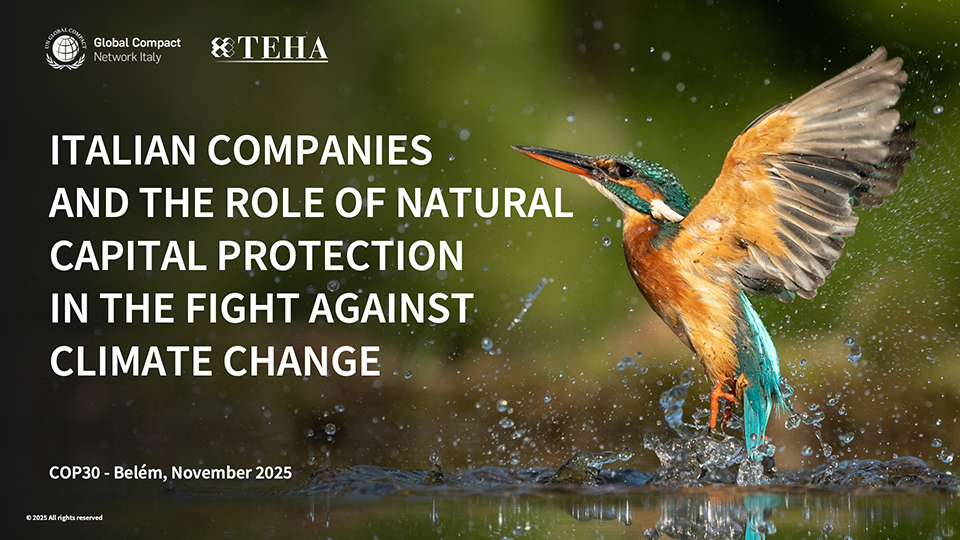Biodiversity still a weak point in corporate environmental strategies: only 42% of companies monitor impacts
Italian companies are becoming increasingly aware of the strategic value of nature, but biodiversity remains largely absent from environmental strategies. This is the message from the new report "Italian Companies and the role of Natural Capital Protection in the Fight against Climate Change", promoted by the UN Global Compact Network Italy in collaboration with The European House – Ambrosetti, Ca' Foscari University of Venice, with the support of Edison. The study has been presented during COP30 in Belém, at the Italian Pavilion, in collaboration with the Italian Ministry of Environment and Energy Security.
78% of companies recognize the value of natural capital, but only 42% monitor the impact of their activities on nature
According to the survey, 78% of Italian companies recognize that protecting nature strengthens the resilience of their business model. However, only 42% systematically monitor the impacts of their activities on biodiversity and ecosystems.
The research analyzed 169 large Italian companies required to report on sustainability starting from 2024 (excluding banks and insurance companies) and involved 115 UN Global Compact participating companies. The data shows that, while approximately half of the companies have tools for managing emissions, water, and waste, only 8% have already adopted a Biodiversity Transition Plan.
Natural Capital: growing attention, but a structured approach is lacking
Natural capital, the sum of the resources and services provided by ecosystems, is increasingly considered in corporate strategies, but still lacks a structured approach. 57% of companies affirm that they take it into account in their environmental assessments, and 70% recognize that integrating climate and nature into their business strategies brings tangible benefits. Despite this, only one in three has defined a specific corporate policy.
Many companies act primarily to manage environmental risks (67%), but encounter operational difficulties related to supply chain involvement, high costs, and a lack of adequate tools and internal expertise. To overcome these obstacles, the business community is calling for economic incentives, practical guidelines, and effective measurement tools.
An encouraging finding, however, comes from future prospects: 81% of companies plan to strengthen their commitment to nature protection in the coming years.
Natural capital as an economic driver and lever for competitiveness
Globally, the stakes are extremely high: more than half of global GDP—approximately $55 trillion—relies directly on the services provided by ecosystems. In Europe, 72% of businesses rely on at least one natural service, while in Italy, nearly 80% of bank loans are exposed to sectors vulnerable to environmental risks.
Despite Italy's extraordinary natural heritage, which includes over a third of Europe's animal species and nearly half of its flora, the situation is worrying: 58 out of 85 terrestrial ecosystems are at risk, equivalent to 46% of the country's territory.
To achieve the goals set by the 2030 Global Biodiversity Framework, a significant increase in financial flows dedicated to nature conservation will be necessary. Currently, against an estimated requirement of $1.15 trillion per year (equivalent to 1% of global GDP), only $208 billion is mobilized. Public resources are insufficient, as is the share—approximately $35 billion—from the private sector. A new public-private alliance is therefore needed, capable of catalyzing capital, innovation, and expertise, building development models that are regenerative for nature and sustainable for the economy.
Sustainability and competitiveness: an inseparable pair for the future of business
Business competitiveness and economic stability increasingly depend on the ability to protect natural capital. Ignoring the value of nature jeopardizes people's well-being, the solidity of financial systems, and the country's development prospects.
With the growing loss of biodiversity and the degradation of ecosystems, it is essential to adopt an integrated approach that involves institutions, businesses, governments, and citizens. Companies must learn to understand and manage their dependencies and impacts by setting measurable objectives, investing in tools, skills, and governance, and building partnerships along supply chains.
Protecting nature is no longer just an environmental responsibility, but a strategic choice that strengthens business resilience, creates shared value, and prepares companies for a future in which sustainability and competitiveness will be increasingly interdependent. In this scenario, the UN Global Compact Network Italy continues to promote training, the exchange of best practices, and collaboration among companies committed to the ecological transition.
» The research is available here.

